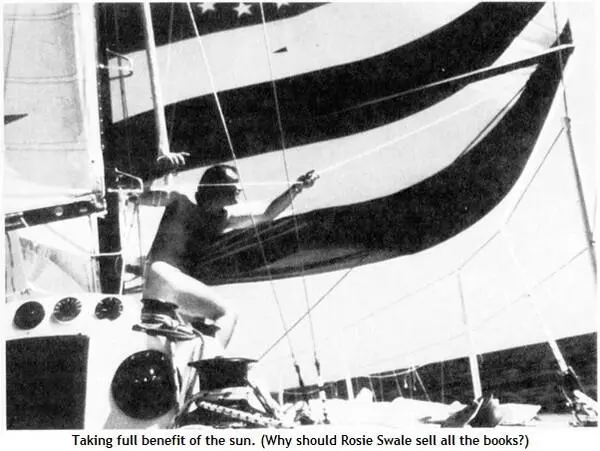A northeasterly gale held up work on the boat for another two days, giving me a breather to enjoy the stories of the anti-communist demonstrations in Ponta Delgado and Horta. At that time Portugal, which owns the Azores, was going through a political upheaval and it looked as though there might be a communist takeover of the country. The Azoreans, who are pro-American, pro-English, and anticommunist, did not like the sound of this at all, and a considerable number of them were talking of declaring independence if the communists succeeded in Lisbon. There were very few communists in Horta, but that was apparently too many. There were large demonstrations in the middle of the night, which I slept through. On one occasion the plan had been to burn the local communist headquarters, but it seemed that a rather nice person lived next door and no one wanted to risk the fire spreading there, so a discussion was held and it was decided to remove the communists’ books and papers and burn them outside. The communists retaliated by sabotaging the record player at the local discotheque. On another island a large crowd escorted two communist leaders down to the sea and tossed them in. When they realized that one of the two could not swim they immediately rescued him. The Azoreans are like that.
September had arrived, and I was beginning to worry about getting home before the equinoctial gales started. I had never heard of the equinoctial gales until Bill had casually mentioned their occurrence on the passage out. As I made my final preparations, stocking up on Pico Branco and fresh food from the lovely local market, I checked with the meteorological office at the American air base on another island. There was still a stiff northeasterly wind blowing, and I did not relish the thought of beating back to the British Isles after beating all the way out. The duty officer said I could expect the northeasterly to continue for a day or two, then moderate and swing around to the south or southwest. That wind should hold for a few days, then veer to the northwest. He advised me to sail due north until the wind veered so that I would be in a position to take advantage of the northwesterly. He also said that I probably wouldn’t experience winds of more than twenty-five knots on the passage home. As it turned out, he was right about everything except that.
On my last night in Horta there was a dinner party aboard Polaris, and then I performed the ritual every yachtsman follows before leaving Horta. I painted a golden harp on the harbor wall next to all the other yachts’ names and symbols, hundreds of them, including Chichester’s, that have accumulated there over the years. The next morning, September 4, I collected fresh bread and, particularly, banana bread from the Estalagem, gathered my gear together, and, with Len, rowed out to Harp. Len helped me deflate and stow the dinghy, had a last look at the electronics, and got a lift ashore. I started the engine, slipped the mooring, and motored past Polaris for a last shouted goodbye. I truly hated to go.
I motored through the harbor entrance, nearly in tears, passing the Pico ferry; everybody aboard waved goodbye. I unreefed the genoa, switched off the engine, and started to beat toward Pico in the fresh northeasterly. The seven-thousand-foot volcano was distinctly outlined against the bright blue sky, not wearing its usual crown of clouds. It suddenly occurred to me that I had never, not once, sailed Golden Harp single-handed.
I began to consider wintering in Horta.
18
Alone from Horta to Crosshaven
I began to tune the rigging — adjusting the shrouds until the mast was standing straight on both tacks, something somebody had told me how to do in Horta. It worked, and by the time I had finished, my initial nervousness at sailing the boat alone was gone. I began really to enjoy myself; it was a wonderful feeling of self-sufficiency.
Pico began to recede into the distance as we (I always thought of Harp and me as “we”) approached Graciosa. As night fell, I navigated from bearings on the many lights dotted about the island. We pointed toward the western end of Graciosa, taking a different route from the passage out, and I rested fitfully, coming up often to check my bearings. I would not really feel comfortable until we had cleared Graciosa and were in the open sea with no rocks to pile up on.
Our first full day out was sunny and clear, lovely sailing, but with the wind still on the nose and dropping. Late in the afternoon I sighted a ship and got my KVHF flags up in a hurry, something I was getting good at. She was the Polish merchant ship General Madalinski, and I got the usual warm reception from the radio operator, who agreed to send telegrams to the States and Ireland for me. The captain gave me a position which closely corresponded with my own navigation, a great relief, since that day I had done my very first noon position on my own. I spent the time reading and listening to the American Forces radio station at Lajes Field in the Azores, which was much like listening to a small-town American radio station. The news was particularly nice to hear, since I hadn’t read a newspaper or listened to the radio for more than two weeks.
I got my first good night’s sleep and awoke to find us nearly becalmed. I set the drifter and had to work all day at keeping the boat moving in the light airs. At my next noon sight we had covered only thirty-five miles, a discouraging figure, but shortly after lunch the wind swung around behind us and I was able to set the Betsy Ross floater spinnaker. The boat’s speed increased immediately from two to three and a half knots, more when the wind puffed a bit. Fred steered perfectly, the sun shone, and I had the best sailing I had ever experienced, lying naked on the deck with a glass of wine and soaking up the sun while Harp took care of herself. This was a totally sybaritic experience and was the time when I most wished I had someone to share the trip with. Randiness began to set in.

In the afternoon I contacted a Russian merchant ship, the Alexander something-or-other, and got the first cool reception in my experience with other ships at sea. They gave me a position and weather report but they didn’t seem too happy about it and, since I had sent telegrams the day before, I didn’t press them to pass on messages. They divulged that they were en route from Leningrad to Cuba and then signed off.
I went to sleep with the floater still up and woke at midnight to find that the wind had risen and the spinnaker had torn along the starboard leech. When I went to get the sail down, the deck lights shorted again and I had to do it in the dark. I was very sad about the spinnaker, since it had become my favorite sail. It was like seeing a good friend with a broken leg, and I folded it into its bag to await the ministrations of John McWilliam in Crosshaven.
Now I had day after day of free sailing. On the eighth I was making six to seven knots in ten to twelve knots of following wind when a very embarrassing thing happened — or, at least, it would have been embarrassing if there had been anybody there to see it. I got a bad spinnaker wrap; my Irish tricolor all-rounder wrapped around the forestay in the middle, while remaining full of wind at the top and bottom, giving the effect of an overengineered brassiere sticking out in front of the boat. I tried everything I could think of to free the sail, but it refused to unwrap and it began to look as if I would have to climb the mast to unwrap it from the top. It was mid-afternoon and I decided that since we were still making a good speed I would leave things as they were until it began to get dark. If the spinnaker hadn’t unwrapped itself by then, and I fervently hoped it would, then I would go up the mast and free it. In the meantime, a beer seemed a good idea. After all, I was in the middle of the North Atlantic Ocean, and there was nobody there to witness my humiliation. Why not relax?
Читать дальше













